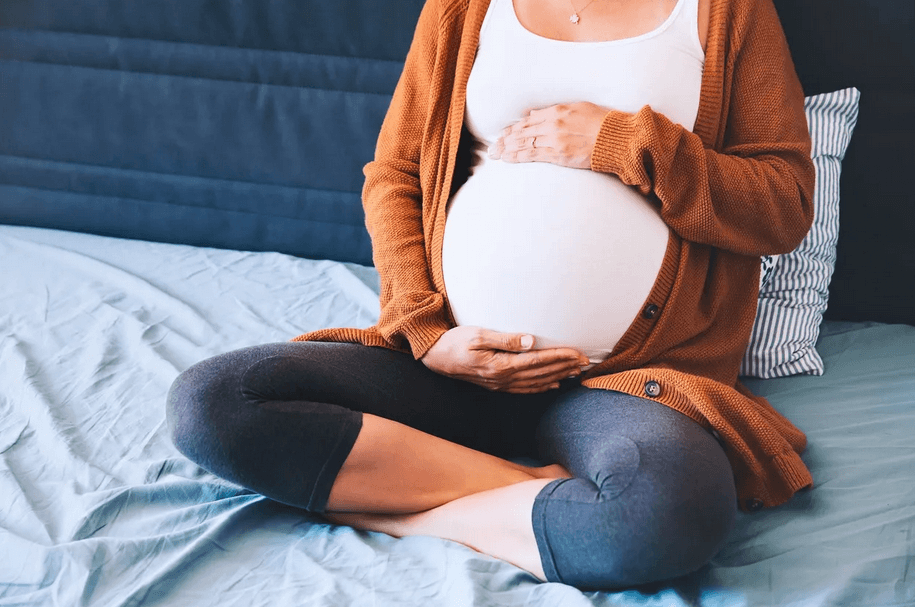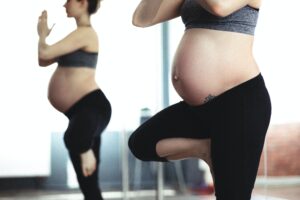
A typical pregnancy lasts about 38-42 weeks. These weeks are broken into three trimesters. It can be confusing to know which trimester you’re in as the first and second trimester weeks can vary a bit based on source.
The first trimester is the first 12 to 13 weeks of pregnancy. This means the second trimester begins at 13 or 14 weeks, again depending on the source.
Fortunately, the third trimester weeks are easier to understand as there’s not a variation in when it begins.
Which Weeks Are The Third Trimester?
The third trimester begins during week 28 of your pregnancy. The third trimester ends whenever you give birth. There’s a wide range in when your baby will be born, but generally a healthy full-term pregnancy lasts 39-42 weeks.
While weeks 37 and 38 are considered full term, they’re now defined as early term. This means it’s not appropriate to induce or schedule a c-section during these weeks unless medically indicated.
While week 41 is after your estimated due date, it isn’t considered post dates as a due date is simply an estimate. From 41-42 is considered late term. If you go beyond 42+0, then you’re postdates.
How Many Weeks Is The Third Trimester?
As mentioned above, your third trimester begins during week 28. A full term third trimester will be approximately 12 weeks long. However, it can range from 10-14 weeks and still be considered a term pregnancy.
If you experience a premature birth, then your third trimester will be however many weeks you go beyond 28.
As difficult as the third trimester can be for some women, the development and growth your baby makes towards the end of pregnancy is extremely important.
What Are Third Trimester Symptoms?
Now that you’ve made it through the first and second trimester, you’re likely well acquainted with common pregnancy symptoms. As each week of pregnancy passed, you probably noticed continual changes with your body and symptoms.
As you enter the third trimester, you might be curious about what to expect during the third trimester. While each pregnancy is unique, there are some symptoms common to the third trimester.
The beginning of the third trimester can be quite different from the end of the third trimester. Weeks 28-32 you might experience:
- Starting to feel short of breath as baby grows larger and takes up more space in your abdomen
- Increase in appetite as baby begins to rapidly put on weight
- Insomnia as hormones fluctuate and it becomes more difficult to get comfortable
- Nervousness about preparing for labor and birth
- Leaking colostrum (the first breast milk your baby will eat)
- Starting to feel aches and pains as pregnancy weight takes its toll and the hormone relaxin causes your joints to loosen
Not everyone experiences each symptom, but these are some common symptoms.
Midway through your second trimester, weeks 33-37, the symptoms can be similar to the beginning but become more exaggerated as hormones fluctuate and your baby gets bigger.
During the middle of your second trimester you might experience:
- Hot flashes as your hormones and metabolism fluctuate. Your growing baby demands a lot which increases how fast your metabolism works. A faster metabolism can cause the body to warm up
- Becoming easily dehydrated, and subsequently having headaches. Your body’s fluid needs increase so be sure to drink plenty of water and avoid or limit caffeine and sugar which can lead to dehydration
- Braxton hicks or ‘practice’ contractions
- An increase in heartburn or a return of pregnancy nausea as your growing baby pushes up against your digestive tract
- Feeling foggy from an increase in insomnia and hormones
During the end of the third trimester
At the end, many women experience an increase of many of the above symptoms as well as symptoms of prodromal and early labor. Some women experience the following during the end of pregnancy:
- Extreme insomnia
- Nesting instincts
- More aches and pains, including real, early labor contractions a few days or even a few weeks before active labor begins
- A decreased appetite as the stomach becomes compressed by your growing baby
- Early labor symptoms
The length of the end of your third trimester is a bit unpredictable as the range of a typical pregnancy is 38-42 weeks.
What Do I Need To Know About The Third Trimester?
One of the best ways to prepare for the end of your third trimester is spending the beginning of it learning all about labor, birth and your postnatal recovery.
While there are many options for antenatal education, an independent and comprehensive childbirth class can help your prepare for the end of your pregnancy, your birth and your recovery.
Be sure to read 9 Ways Independent Birth Classes Can Help You Get Better Results to learn more about the benefits of taking a comprehensive class.
Other important things to know about the third trimester:
- While a baby’s movement might feel different as they’re less able to do flips or big kicks, you should still feel your baby move as frequently as they always have
- Staying hydrated is an important part of feeling your best and reducing Braxton hicks contractions
- It’s important to know the signs of labor and if you’re less than 37 weeks pregnant immediately report symptoms of labor to your midwife or doctor
- Your estimated due date is just that, an estimate. Only 3-5% of babies are born on their due date


Great Post